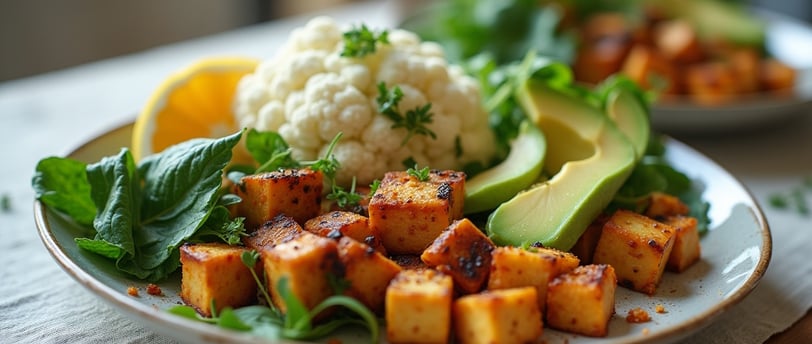4 Simple Tips for Plant-Based Keto Meal Plans
Are you tired of the same old meal plans that don't align with your plant-based keto lifestyle?
NUTRITIOUS MEALRECIPESPLANT-BASED KETOHEALTH
5/12/20255 min read


Are you tired of the same old meal plans that don't align with your plant-based keto lifestyle? Well, look no further because we have four simple tips that will revolutionize the way you approach your meals.
These tips are designed to help you navigate the world of plant-based keto with ease, giving you the tools you need to create delicious and nutritious meals.
So, if you're ready to take your plant-based keto journey to the next level, keep reading to discover these game-changing tips that will leave you feeling satisfied and energized.
Plan Your Meals in Advance
To successfully follow a plant-based keto diet, it's crucial to plan your meals in advance. Meal prepping can be a great way to ensure that you have nutritious and delicious meals ready to go throughout the week. By dedicating some time each week to plan and prepare your meals, you can save time, reduce stress, and stay on track with your plant-based keto lifestyle.
When it comes to meal prepping for a plant-based keto diet, there are plenty of recipe ideas to choose from. Start by focusing on low-carb vegetables such as leafy greens, broccoli, cauliflower, zucchini, and bell peppers. These vegetables aren't only packed with nutrients but also low in carbohydrates, making them perfect for a plant-based keto diet. You can roast them, sauté them, or use them as a base for salads or stir-fries.
In addition to vegetables, incorporate plant-based proteins into your meal prepping. Beans, lentils, tofu, and tempeh are all great sources of protein that can be used to create satisfying and flavorful meals. Try making a batch of vegan chili, a tofu stir-fry, or a lentil curry that can be portioned out and enjoyed throughout the week.
Focus on Plant-Based Protein Sources
Incorporating plant-based protein sources into your meals is essential for maintaining a balanced and nutritious plant-based keto diet. While animal products are often relied upon for protein, there are plenty of alternative protein options that can meet your needs.
Here are two sub-lists of plant-based protein sources that not only provide essential amino acids but also offer additional health benefits:
1. Legumes:
- Lentils: These small legumes are packed with protein, fiber, and important nutrients like iron and folate. They're also low in carbohydrates, making them a great option for a plant-based keto diet.
- Chickpeas: Rich in protein and fiber, chickpeas are versatile and can be used in salads, soups, or even roasted for a crunchy snack. They're also a good source of vitamins and minerals, including manganese and folate.
2. Nuts and seeds:
- Almonds: These nuts aren't only a good source of protein but also provide healthy fats, vitamin E, and magnesium. They can be enjoyed as a snack or added to salads, smoothies, or keto-friendly baked goods.
- Chia seeds: These tiny seeds are a powerhouse of protein, fiber, and omega-3 fatty acids. They can be used as a topping for yogurt or oatmeal, or mixed into smoothies and baked goods.
Incorporating these plant-based protein sources into your meals won't only help you meet your protein needs but also provide various health benefits. By choosing alternative protein options, you can enjoy the benefits of a plant-based keto diet while still maintaining a balanced and nutritious eating plan.
Incorporate Healthy Fats Into Your Meals
In order to maximize the nutritional benefits of your plant-based keto meal plan, it's important to incorporate healthy fats into your meals. Healthy fats are a crucial component of a balanced diet as they provide energy, support brain function, and aid in the absorption of fat-soluble vitamins.
When following a plant-based keto diet, it's essential to choose healthy fat sources that align with your dietary restrictions.
Avocados are an excellent source of healthy fats and can be enjoyed in various ways. You can add sliced avocado to salads, mash it onto toast, or use it as a base for creamy sauces and dressings.
Nuts and seeds are also great options for healthy fats. They can be sprinkled over salads, blended into smoothies, or enjoyed as a snack on their own.
While incorporating healthy fats into your meals is important, it's crucial to practice portion control. Fats are high in calories, so it's essential to consume them in moderation. Aim for a serving size of one tablespoon of oil or two tablespoons of nut butter per meal. This will help you maintain the appropriate caloric intake while still reaping the benefits of healthy fats.
Include a Variety of Low-Carb Vegetables
When it comes to maximizing the nutritional benefits of your plant-based keto meal plan, incorporating a variety of low-carb vegetables is key. Not only do low-carb vegetables provide essential vitamins, minerals, and fiber, but they also add flavor, color, and texture to your meals.
Here are some simple tips to help you include a variety of low-carb vegetables in your plant-based keto meal plan:
- Roasted cauliflower: This versatile vegetable is a great low-carb alternative to starchy side dishes. Roasting cauliflower brings out its natural sweetness and gives it a satisfying crunch. Try tossing cauliflower florets with olive oil, salt, and pepper, then roasting them in the oven until golden brown. You can also use roasted cauliflower as a base for grain-free pizza crusts or as a substitute for rice in stir-fries.
- Zucchini noodles: Also known as 'zoodles,' zucchini noodles are a fantastic low-carb substitute for traditional pasta. Use a spiralizer or a julienne peeler to transform zucchini into long, noodle-like strands. Sautee the zoodles in a little olive oil until tender, then toss with your favorite sauces or toppings. Zucchini noodles are a great way to add volume and fiber to your meals without the added carbohydrates.
Stay Hydrated and Mindful of Your Electrolyte Intake
To maintain optimal hydration and ensure proper electrolyte intake, it's important to be mindful of your fluid levels and electrolyte balance while following a plant-based keto meal plan. Electrolytes are minerals that play a crucial role in maintaining fluid balance, nerve function, and muscle contractions. On a plant-based keto diet, it can be challenging to get enough electrolytes, especially if you're not consuming animal products that are rich in these minerals. Therefore, electrolyte supplementation and staying hydrated become even more important.
When following a plant-based keto meal plan, it's essential to drink enough water throughout the day. Water helps transport nutrients, regulate body temperature, and support various bodily functions. Aim for at least eight cups of water per day, but adjust based on your activity level and individual needs.
Additionally, incorporating foods rich in electrolytes can be beneficial. Avocados, leafy greens, nuts, and seeds are excellent sources of potassium and magnesium, two essential electrolytes.
If you find it challenging to meet your electrolyte needs through food alone, consider electrolyte supplementation. Look for supplements that contain a balanced blend of sodium, potassium, magnesium, and calcium. These supplements can help replenish electrolytes lost through sweat and support optimal hydration.
Conclusion
By planning your meals in advance, focusing on plant-based protein sources, incorporating healthy fats, and including a variety of low-carb vegetables, you can enjoy a nutritious and satisfying plant-based keto diet. But don't forget to stay hydrated and mindful of your electrolyte intake.
Are you ready to embark on this delicious and healthful journey?
